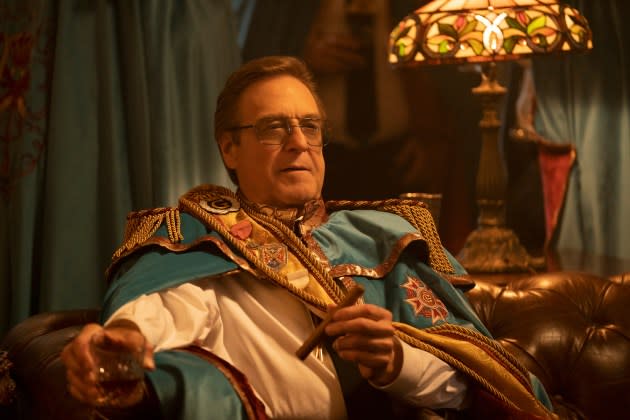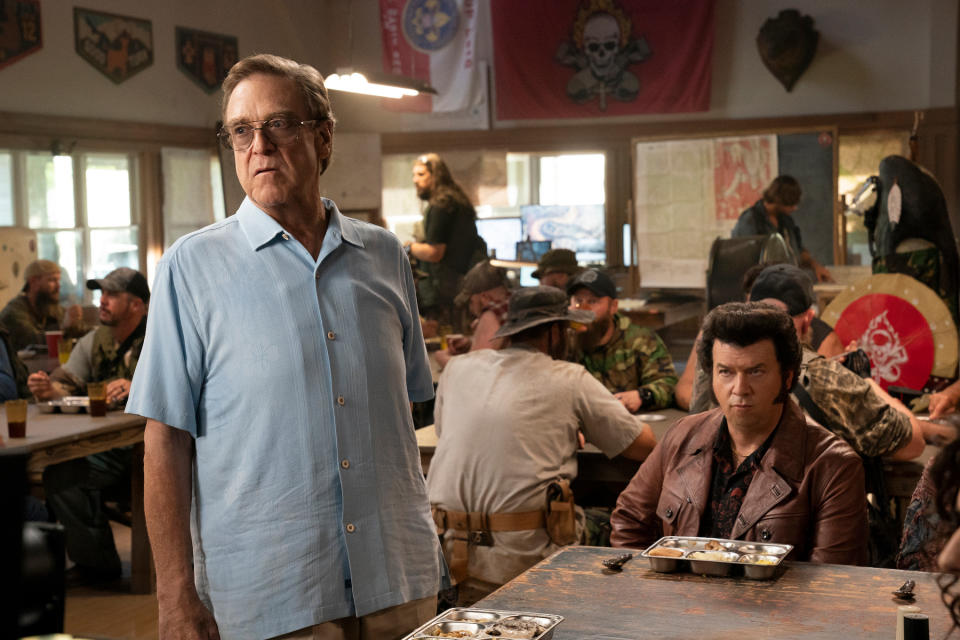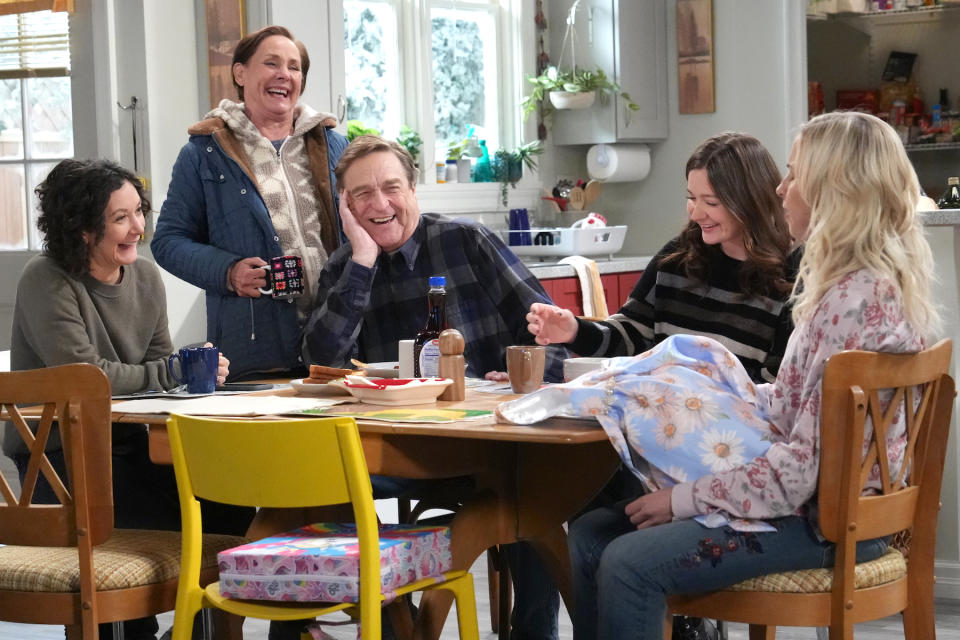John Goodman Isn’t Angry Anymore. Unless He Watches the News
- Oops!Something went wrong.Please try again later.
- Oops!Something went wrong.Please try again later.
- Oops!Something went wrong.Please try again later.
- Oops!Something went wrong.Please try again later.
- Oops!Something went wrong.Please try again later.
- Oops!Something went wrong.Please try again later.
- Oops!Something went wrong.Please try again later.

John Goodman has a lot of catching up to do. Over the past six years, the renowned actor has been so busy rebooting his role as Dan Conner on Roseanne and The Conners, and establishing himself as televangelist patriarch Eli Gemstone on the fantastic HBO series The Righteous Gemstones, he hasn’t had time for the little things, like following up on medical appointments and getting back to the boxing gym, just a few years after he shed more than 200 pounds. “It’s like I didn’t have any time off,” he tells Rolling Stone.
But the work has paid off. Gemstones, whose third season premieres on Sunday, June 18, has attracted a devoted following, not just because of Goodman’s straight-man patriarch, but the off-the-cuff humor of its creator and star, Danny McBride. In the show, Goodman plays the aging head of a megachurch and Christian media empire, whose three bumbling, self-obsessed children — Jesse (McBride), Kelvin (Adam Devine), and Judy (Edi Patterson) — can’t seem to stop arguing long enough to take the reins. Each season has offered the family a new obstacle, mixing in episode-long flashbacks to layer context and history into the narrative arc. In the new season, they’re forced to contend with their actions around Y2K and the turn of the millennium — and the people they’ve screwed over along the way.
More from Rolling Stone
Farruko Declares That 'Everything's Temporary' With Spiritual Single 'Pasajero'
Michael Cera on Almost Marrying Aubrey Plaza and Getting Slapped by Rihanna
For Goodman, 70, whose comedy chops have spanned 13 hosting gigs on Saturday Night Live, countless comedy-movie classics, and one of the most beloved sitcoms of all time, it was the humor that drew him in. “It’s not dangerous-dangerous, but it just builds up to wild,” Goodman says. “It’s just wildly funny. I’m not really big on dick jokes, but goddamn they’re funny.”
Let’s start with Eli Gemstone. With every season, you get all these cool new layers of backstory.
Yeah. It’s interesting, ain’t it? It’s much better than any backstory I can come up with.
What was it like going into this third season where you’re getting into so much of these really dark chapters of the Gemstones’ lives?
Well, that’s what he does besides being a straight man, is just trying to fix things. Not like a fixer would, but in a moral sense, as well. He’s like a mechanic with these kids. You know, it’s constant maintenance.
When you were creating the role, where did you pull inspiration from for Eli?
A lot of obvious stuff, like Billy Graham. Not so much some of the loons like Pat Robertson or, you know, the magic acts, Oral Roberts, although that’s fun. You know, the guys that belong at Ringling Bros. That’s pretty much it. He’s kind of a moderate guy. He’s sharp. Coming up from professional wrestling, he’s pretty hip to show business and what an audience wants, but not to an extreme.

Did you draw on your own experience growing up within the church?
I was raised as Southern Baptist and yeah, my grandma would take me to tent revivals, that kind of stuff. They yelled a lot in my church. I really didn’t dig that. But what I remember the most is the way it was built to an emotional climax. I mean, you work these people and they start crying and get very emotional and that leads to — they can have their way with a crowd. It’s fascinating, the patterns that they use in their speech, but the music, they call for the sinners to come forth and it’s very emotional. But I remember that being a huge part of it.
Since the show started in 2019, the culture wars have really intensified. And I was wondering if that’s something you considered — this Pat Robertson-ification of politics?
It was never in the script, thank God. It’s just something that never came up. But yeah, he’s in the middle. There’s other extreme people like Baby Billy [Eli’s brother in law, played by Walter Goggins] and some of the other pastors that will do stuff like that. I don’t think it’s Eli’s thing. I think he’s, you know, a pretty honest guy with the show business. As honest as you can be with that kind of show business and pretty rational.
In making the show it seems like, at least with the kids, there’s a lot of adlibbing going on.
Oh yeah.
Are you doing that as well?
I’m not good at it because I try to write when I’m speaking and it never works out. I’m trying to learn, though. It’s something I missed in my education. But I’ll just sit back and watch them go. And if I have anything to throw in, I’ll throw it in. But I like it when it gets silly. Because there’s no way they’re going to use some of this stuff. But yeah, it’s fun. I just don’t trust myself with it because it’s not something I came up in.
You came up in the theater?
Yeah, just theater. Yeah. It was a lacking part of my education. I had a chance to do it and I just opted to stay in New York and do what I was doing.
It’s the 25th anniversary of The Big Lebowski, which must have been a very different kind of production to work on.
That was. Everything was on the page. I think Jeff [Bridges] got a couple of adlibs in that made it. He called The Big Lebowski a human paraquat. But what they had on the page was so beautiful, what’s the point? It’s sure better than anything I could come up with.
At what point did you guys realize that it was gaining the intense popularity that it would come to have?
I didn’t care until it really broke because I loved it so much. It’s one of those deals where you’re proud of something and you really don’t give a shit what anybody else thinks. To me, it was one of the best experiences I’ve had. And just being there hanging with Jeff was great. Zen man. He abides in life.
Truly. I saw that he had mentioned maybe doing a Big Lebowski Two. Is that something you would ever consider?
That would have to come from Joel and Ethan and they don’t do sequels.
Yeah, I —
But hell yeah. I mean, yeah, I’d be, [joking] No, I’m going to hold out.
So in that movie, you play a very religious converted Jew.
Yep.
Where do you think Walter and Eli would overlap in their beliefs?
Boy, well, I think Eli is going to be the kind of guy that lets Walter gas on. Either hang himself or try to settle whatever the hell is wrong with Walter these days. Walter wants to get back with Cynthia.
Is Walter still pining for her? Is that where he is now?
Well, I mean, he brought her Pomeranian to the bowling alley. He’s babysitting while she went to Honolulu with her husband and he takes their dog, which is the same way he converted to Judaism.
But you think 25 years later he’s still pet-sitting for her?
Yeah. I think that’s a good excuse not to have to interact with any more women.
Good point.
He’s frightened of them. He doesn’t get it. And if he can just hold onto that belief that he’s still in love, it makes perfect sense for him because it gives him something to mope about.
Yeah. Do you think Eli would understand that?
I don’t think Eli would care. No. Eli’s got his own — it’s not an obsession. He still misses his wife. Because how else is he going to put a lid on the goddamn kids.
Speaking of kids, you’re playing a patriarch on two very different shows right now, The Righteous Gemstones and The Conners. What’s that been like for you to toggle back and forth?
Maybe it’s helped me to be a better father, or some obvious bullshit like that. I don’t know. It’s weird, it just hit me that I grew up without a father, so that’s a little strange. So I’m learning. But yeah, because he’s kind of stuck in the middle, too, on The Conners. And I kind of play the straight man a lot too, just mediating things and listening.
What was it like to come back to that role?
I hate the word “surreal” but there was a touch of it when I walked back onto the set and there was an exact replica. It was like a time shock.
A few months into production, Roseanne posted a tweet that got her fired from the show. Was it strange after her exit to revisit that character from such a different direction?
Yeah. I just had to put aside some of my own feelings. I liked the show, I liked what we were doing, and wanted to continue.
Have you been in touch with Roseanne at all?
No.
Going back to the initial reboot, were you sold as soon as you saw the script, or did you have to consider it?
Yeah, the original deal was, Sarah Gilbert had a talk show called The Talk, and we were on there and we were doing a Dan and Darlene bit — this is going on seven or eight years ago — and she just happened to ask me, “What would you think if there was a reunion?” And I said, “I’d jump all over it.” Well then she called Roseanne and then called Tom Werner. And I think we had eight shows, something like that. It was interesting. And then ten weeks later I was out of a job. The next day after they shut down Roseanne, I got a call about The Righteous Gemstones. I read the script and then I jumped on it.
Had you been a fan of Danny McBride’s other shows, Eastbound and Down and Vice Principals?
Yeah. The first time I saw [his] commitment to these roles, to playing such an unpleasant motherfucker, was staggering. I wondered if he was all there — he just went for the wall and he’s an interesting man. And then the more I knew him — [his] production company bought a Sears department store and turned it into a studio in Charleston, South Carolina, which is where they live and where they choose to work. And it’s employing a lot of people. And it’s funny, there’s no assholes. Unless it’s me.
Do you find yourself in the role of Eli to the kids there?
Yeah. Yeah. Well, they’re all younger than I am and I’m just an old fucker who solves crossword puzzles and reads. When we’re sitting in our director’s chair, it’s like they’ve got the world figured out. And the other kids [Jesse, Kelvin, and Judy on the show] don’t. They just don’t. It’s a tribute to self-absorption, those kids are. It’s a festival of self-absorption.
Backing up a little. You’ve had such a prolific career, toggling between film and TV — especially pre-streaming — in a way that few other actors of your generation have. Was that a conscious decision? How have you navigated that?
No. It’s just whatever. Sometimes I had to take what I could get because it’d get dry sometimes and there was nothing to go to, so I did the stuff with no choice. But I’ve been lucky for a little while where I could turn down things I don’t really want to do. But there’s no conscious career choice or anything, any plan, any guideline anymore, any moral sense of anything.
They’re the creators. They should have a larger share — and like I said, I am nothing without a writer.
Do you have a particular role that you think is underrated? Because for me, it’s definitely King Ralph. I love that movie.
That’s one I wish I could do again. I study Peter O’Toole every day. He’s just an indescribable figure. And it was great and I wish I could have just relaxed and had more fun with it when I was doing it. I still really didn’t know what I was doing. And goddamn, the cast is unbelievable. Yeah. A treasure trove of Britannia. They were wonderful people.
Was that your first major leading role?
Actually, no, it was the second one. In 1986, I did a movie for David Byrne, [True Stories]. So I left a Broadway show to go do that. And then, yeah, I think that was the first one. And then I did a couple more after that and I figured I’m not going to put any butts in the seats, so why bother.
And that was around the time that you signed onto Roseanne?
I was on Roseanne in 1987, but I would do two films in the summer and then go back to the TV show. The year I did Ralph, I also did Barton Fink.
That sounds like it would’ve been a lot.
Yeah, it really didn’t take too much then. It was tough. I just kept working.
I was wondering if you had any thoughts on the WGA strike, and particularly if you see a future where AI has any role in creating scripts?
I have no idea. I don’t know. It’s just a matter of heart and human ideas, that’s all I’m interested in. [As far as the contracts,] it just makes sense to include the people; include the creators in your payout. They’re the creators. They should have a larger share — and like I said, I am nothing without a writer.
There was one thing I’d read about that you’d written. Early in your career, you had auditioned for SNL, and —
Oh God. You know who got a part that year?
Who?
Laurie Metcalf.

Oh really? There you go.
Yeah. She got hired in, I think it was 1980. I don’t know if she ever made it up there. But yeah, I just wrote something like the night before. I had no idea what I was going to do. It was, Christ, godawful, and… Jesus Christ. But yeah, I was just, for some reason, I guess I think they owed me: “Hey, you owe me this. I think you’re funny.”
Do you remember what the sketch was that you wrote?
No. No. I don’t want to. It’s painful. It’s painful to think of.
Well, it seems like you’ve made good with SNL since then.
Yeah, those were fun days. That used to be the highlight of my year.
Do you have any other dream roles?
Yeah, there’s a couple of others. They might sound ludicrous coming from me, but yeah, I’d like to do James Tyrone in Long Day’s Journey into Night sometime. It would probably take me two years of training to get there but I think I could do it. I’d like to do some more theater there. It’s just great.
Do you have any plans to return to theater?
Yeah, I’ve been busy ever since I did the last Broadway show I did, right after Roseanne came up. So that’s what I’ve been doing, and Righteous. And so now I’ve got a little break. I’m trying to squeeze all the medical shit in that I’ve missed over those years.
As a person in recovery, and a person who had recently lost a great deal of weight, how were you able to make routines to support yourself through that?
That was just getting out and walking the dogs. I was boxing up until then and I haven’t been able to do that since Covid because I’m lazy. I haven’t been exercising, but I’m going to start a routine again this summer where I can get some stuff done. I’ve just let everything go just because I haven’t had the energy because of the jobs.
Boxing — that’s your sport of choice?
I dug that. I dug it. Yeah. Nobody’s going to get hurt, but it’s just hitting the mitts and trying to learn.
Do you spar or do you just train?
No, not really. Just hitting the mitts. I never got good enough where I would trust myself to spar because once I get whacked in the face, I don’t know if I wouldn’t lose it.
Yeah?
Yeah. But someday I’d like to get that far advanced. But it’s usually just an hour, hour and a half of hitting the mitts, hitting the bags, learning footwork. It’s great.
You’ve been open about your struggles with alcohol and anger as a younger man. And I was wondering, especially going into this new season, Eli has this real darkness to him. Were you able to draw inspiration from that?
Well, it was there, might as well use it. Yeah, all that anger was fueled by fear, and the drinking was because it was fun. But I was probably born an alcoholic. But most of the anger’s gone. If I don’t watch the news, I’m cool.
Best of Rolling Stone

